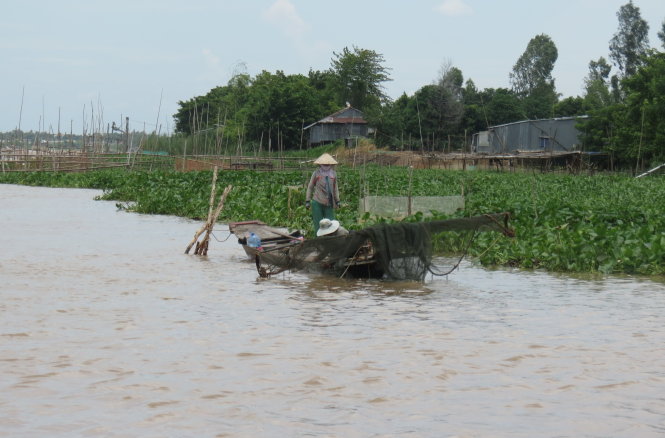Farmers in the Mekong Delta region, located in southern Vietnam, have complained that they are suffering a poor fishing harvest due to low floodwater levels in this year’s flood season, which occurs annually from the late eighth month to the eleventh month in the lunar calendar.
The period generally lasts from September to December, when rising floodwater from the Tonle Sap Lake in Cambodia – the largest freshwater lake in Southeast Asia – flows down the Mekong River to the vast low land in the south of Vietnam before reaching the East Vietnam Sea.
Normally, floodwater may rise around two meters higher than normal seasons and it sinks the majority of rice fields in the Mekong Delta.
The rise of floodwater signals the fishing harvest season. In addition, floodwaters bring with it alluvial silt that helps fertilize farming crops.
It has been different this year because of climate change and the storage of water in the reservoirs of hydroelectricity plants upstream the river in Laos and China.
The vast rice fields in such Mekong Delta provinces as Long An, Tien Giang, Ben Tre, Hau Giang, Dong Thap, Tra Vinh, An Giang, and Soc Trang have had no floodwater.
Tran Thanh Hong, who is in charge of measuring daily water levels at Tram Chim National Park in Dong Thap, said, “Floodwater is coming at the lowest level this year.”
Tram Chim is the lowest area of the region and thus has the highest floodwater.
“In previous seasons, we could drive motorboats to patrol the park in the late eighth month of the lunar calendar,” he added.
“Now, we are walking to do the job.”
According to the committee for the prevention of floods in Long An, the water level measured at Tan Hung and Vinh Hung are 1.55m and 1.52m now, around 0.4-0.6 meters lower than that of the same period last year, or 1.2-2m lower than the measurements in 2011.
Doctor Le Anh Tuan, vice head of the research institute for climate change under Can Tho University, said the amount of floodwater encroaching on the Mekong Delta this year reaches 60-65 percent of that in the previous years.
Lieu Trung Nguon, vice director of the Department of Agriculture and Rural Development in Long An, underlined that low floodwater levels would result in limited farming capacity.
It would require higher costs for fertilizers and pesticides in the following crops, Nguon said.
Insects and mice will destroy more crops in the coming time, he added.
Like us on Facebook or follow us on Twitter to get the latest news about Vietnam!


















































